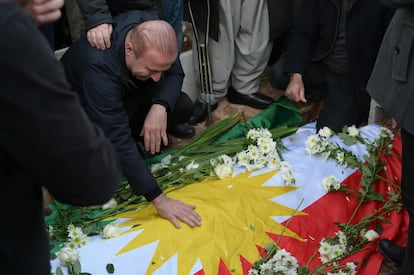Middle Eastern powers take their struggle to Kurdistan, threatening region’s stability
The area is a facing an explosive cocktail of forces, caught between strikes from Iran and Turkey, and America’s military presence. So far it’s managed to keep the situation under control, but it could ignite at any moment


The struggle between the powers of the Middle East threatens to destabilize Kurdistan, a safe area until a few years ago and a key region for the United States. The mountainous region is at risk of becoming the chessboard on which the most powerful countries in the region stake their geopolitical interests. Iran and Turkey have launched strikes on the autonomous Kurdish region, and the U.S. military also has a presence there. Neighboring countries accuse it of harboring terrorist groups, there are complaints about Israel’s alleged influence, and also disputes over oil. It’s an explosive cocktail that, until recently, the Iraqi Kurdish forces had been able to manage. But it could ignite at any moment.
On Monday night, Iran launched a dozen missiles and several suicide drones against targets in Erbil, the capital of Kurdistan. Four civilians were killed — two important businessmen, the daughter of one of them, and a domestic worker — but Iran claimed that it had hit “one of the main espionage headquarters” of Mossad, Israel’s secret services. It said the attack was in retaliation for anti-Iranian activities in the area by foreign organizations and countries.
Hours later, in Ankara, the Turkish Foreign Minister and former head of the secret services, Hakan Fidan, in a parliamentary session, issued a warning: “Despite our sanctions against Sulaymaniyah, the PUK-PKK cooperation continues. If the PUK does not change its attitude towards the PKK, we will not hesitate to take further measures.” He was speaking in reference to the Patriotic Union of Kurdistan (PUK) and the Kurdistan Workers’ Party (PKK), which have both been designated terrorist organizations by the EU and the United States.
Sulaymaniyah is the second-largest city in Kurdistan and the seat of power of the PUK, the political formation that shares control of the territory and the regional government with the Kurdistan Democratic Party (KDP). The KDP is pro-American and close to Turkey, while the PUK is closer to the Iraqi government, and has traditionally maintained ties with Iran.
“We accept that they are regional superpowers, we accept that we have a large border and we accept cooperating with them to maintain security, but they cannot take it out on the poor people of Kurdistan,” says Sadi Ahmed Pire, a spokesperson for the PUK: “We are ready to dialogue, to cooperate, but often we don’t even understand what they want, because the excuses they use for their attacks are false.”
After neutralizing the PKK on Turkish soil, over the past five years, the Turkish Armed Forces have been intensifying their strikes on the mountainous region, where the Kurdish group’s bases are located. The Turkish military has also advanced and fortified its positions within Iraqi territory. But in the last month, they have lost more than 20 soldiers in combat against the PKK, a figure not registered for years, which has angered the Turkish government.
These attacks are not only targeting the mountainous border areas. Until a few years ago, the Kurdistan region was the safest and most stable in Iraq. It welcomed foreign investment and tourism, and provided refuge to those fleeing sectarian violence in the rest of the country. But that is changing. Data from the Armed Conflict Location and Event Data Project (ACLED) show that, in the last year alone, more than 3,700 violent incidents occurred in the provinces under the control of the Kurdistan regional government, including bombings, attacks, combat, and political assassinations — almost three times more than in the rest of Iraq. The number of deaths is still lower (451 compared to nearly 1,000), but the population of the Kurdish provinces barely represents 15% of the entire Iraqi population.
In addition to Turkey, since 2020, Iran and its allied militias in Iraq have repeatedly attacked various locations in Kurdistan, especially its capital. One of the objectives has been the airport area, in the north of Erbil, which is next to a military base with troops from the anti-jihadist coalition and a large U.S. consular complex. As a result of the attacks, some commentators have called on U.S. military personnel to stay away from residential areas, arguing their presence may endanger civilians as they are being targeted in the strikes. There have also been attacks, murders and assassination attempts — likely orchestrated by neighboring countries — against Kurdish activists and politicians who fled from Turkey and Iran.
“Kurdistan has stayed out of the area’s sectarian violence and international tensions, actively seeking to contribute to stability. We have told Iran, Turkey and other actors in the region to stop attacking us, not to hold us responsible for their internal failures and their inability to resolve their respective Kurdish issues,” said Janghis Awakalay, PDK international relations coordinator.
Accusation of cooperation with Israel
The fear now is that, in addition to the underlying tensions with neighboring countries, the Gaza war will spill over into Kurdistan. Iran accuses the region of having a secret alliance with Israel, a rumor that is repeated by other regional actors. “From time to time, the Mossad has given aid to the Peshmerga [Kurdish fighters], but the ties should not be exaggerated either. These accusations are, in many cases, part of anti-Kurdish and anti-Semitic conspiracy theories,” says a former foreign diplomat with extensive experience in Iraq.
It is true that, historically, Israel has supported the Kurdish cause in its attempt to weaken enemy Arab regimes, and also Iran and Turkey, when they ceased to be allies. Israeli Prime Minister Benjamin Netanyahu himself publicly supported the Kurdistan independence referendum called in 2017, which no country in the world recognized and which further muddied relations between Baghdad and the autonomous region.
According to Israeli television i24, at that time, Israel even bought half of the oil that Kurdistan pumped through a pipeline running through Turkey, despite Baghdad’s opposition to Erbil’s unilateral export. That avenue was closed a year ago when the International Court of Arbitration ruled in favor of the Iraqi federal government and ordered Erbil and Ankara to pay compensation.
In 2022, Iran attacked — without causing any casualties — the home of a Kurdish businessman who was drawing up a plan to export hydrocarbons to Europe with the help of Israel. It was “a multipurpose message to many people and groups. It’s up to them how to interpret it,” an Iranian security source told Reuters at the time.
In the case of the businessman killed in this week’s attack, however, political representatives of the PDK, PUK and Iraqi parties have said that he had nothing to do with Israel. “He was an innocent victim of tensions between Iran, the United States and Israel,” said Bayan Sami Abdul Rahman, advisor to the Kurdish prime minister: “As victims of so many conflicts in the past, [Kurds] do not want to be involved in a regional conflict. We want to have good and peaceful relations with our neighbor Iran, but we cannot remain silent when the sovereignty of our country is violated in this way.”
The Iraqi government, which is trying to counter the influence of Washington and Tehran, filed a complaint against Iran before the U.N. Security Council on Wednesday (a move supported by Erbil). It also recalled its ambassador from Tehran and has called for U.S. troops to leave Kurdistan (a move opposed by Erbil).
The sources who spoke to EL PAÍS are divided on what will happen next. The former foreign diplomat believes that Kurdistan will try to continue to navigate the choppy waters of their complicated neighborhood, just as they have always done. While the PUK spokesperson Pire is resigned: “One cannot choose the geography in which one lives.”
Sign up for our weekly newsletter to get more English-language news coverage from EL PAÍS USA Edition
Tu suscripción se está usando en otro dispositivo
¿Quieres añadir otro usuario a tu suscripción?
Si continúas leyendo en este dispositivo, no se podrá leer en el otro.
FlechaTu suscripción se está usando en otro dispositivo y solo puedes acceder a EL PAÍS desde un dispositivo a la vez.
Si quieres compartir tu cuenta, cambia tu suscripción a la modalidad Premium, así podrás añadir otro usuario. Cada uno accederá con su propia cuenta de email, lo que os permitirá personalizar vuestra experiencia en EL PAÍS.
¿Tienes una suscripción de empresa? Accede aquí para contratar más cuentas.
En el caso de no saber quién está usando tu cuenta, te recomendamos cambiar tu contraseña aquí.
Si decides continuar compartiendo tu cuenta, este mensaje se mostrará en tu dispositivo y en el de la otra persona que está usando tu cuenta de forma indefinida, afectando a tu experiencia de lectura. Puedes consultar aquí los términos y condiciones de la suscripción digital.








































